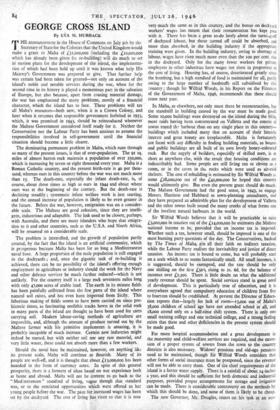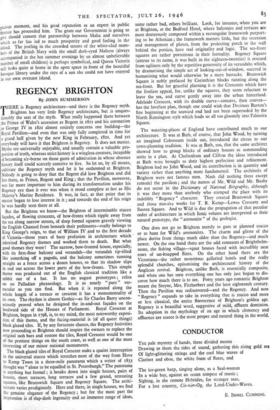GEORGE CROSS ISLAND
By EVA M. HUBBACK- HE rip announcement in the House of Commons on July 9th by the
Secretary of State for the Colonies that the United Kingdom would make a grant to Malta of £31,000,000 (including the kto,000,000 which has already been given for re-building) will do much to set in motion plans for the development of the island, the implementa- tion of which had been held up until it was known what help His Majesty's Government was prepared to give. That further help was certain had been taken for granted—not only on account of the island's noble and notable services during the war, when for the second time in its history it played a momentous part in the salvation of Europe, but also because, apart from causing material damage, the war has emphasised the many problems, mostly of a financial character, which the island has to face. These problems will tax all Malta's resources—both now, when it is a Crown Colony, and later when it resumes that responsible government forfeited in 1933, which, it was promised in 1943, should be reintroduced whenever the Maltese Government considered itself ready for it. Neither the Conservative nor the Labour Party has been anxious to assume the responsibilities involved in self-government until the financial situation should become a little clearer.
The dominating permanent problem in Malta, which runs through so many of the present issues, is that of over-population. The 9! sq. miles of almost barren rock maintain a population of over 250,000, which is increasing by seven or eight thousand every year. Malta is a Roman Catholic country, and the present .birth-rate is 4o per thou- sand, whereas ours in this country before the war was not much more than Is. The death-rate, especially the infant death-rate, is, of course, about three times as high as ours in 1944 and about where ours was at the beginning of the century. But the death-rate is declining steadily ; systematic infant welfare work is just starting, and the annual increase of population is likely to be even greater in the future. Before the war, however, emigration was on a considet- able scale. The Maltese are good colonists, since they are intelli- gent, industrious and adaptable. The link used to be closest, perhaps, with Australia, and there are many islanders who hope that emigra- tion to it and other countries, such as the U.S.A. and North Africa, will be resumed on a considerable scale.
The problem is intensified, and the growth of population partly created, by the fact that the island is an artificial community, which is _prosperous because Malta has been for so long a Mediterranean naval base. A large proportion of the male population is still engaged in the dockyards ; and, once the gigantic task of re-building is achieved, there can be no possibility of the island's offering enough employment in agriculture or industry should the work for the Navy and other defence services be much further reduced—which is not unlikely. For the country itself is a large rock seventeen miles long with only 47,000 acres of arable land. The earth in its minute fields has been painfully collected from the few parts of the island where natural soil exists, and has even been imported from Sicily. This laborious making of fields seems to have been carried on since pre- historic times, as fascinating neolithic tracks hewn in the solid rock in many parts of the island are thought. to have been used for carts carrying soil. Modern labour-saving Methods of agriculture are impossible, and, although the amount of produce turned out by the Maltese fanner with his primitive implements is amazing, it is probably incapable of much increase. Certain new industries might indeed be started, but with neither soil nor any raw material, and very little water, these could not absorb more than a few workers.
Should the naval base be maintained, however, on anything- like its present scale, Malta will continue • to flourish. Many of its people are well-off, and it is thought that about L13,000,000 has been hoarded in the form of currency notes. In spite of this general prosperity, there is a ferment of ideas based on war experience both at home and abroad. Malta will not be content to go back to the " Mediterranean " standard of living, vague though that standard was, or to the restricted opportunities which were offered to her young people before the war. The pace for increased wages has been set by the do..*yard The cost of living has risen so that it is now very much the same as in this country, and the bonus on dockyard workers' wages has meant that their remuneration has kept pace with it. There has been a great to-do lately .about the turning-off of dockyard labour, but those turned off could be absorbed, and more than absorbed, in the building industry if the appropriate training were given.., In the building industry, owing to shortage of labour,' wages have risen much more even than the too per cent. rise in the dockyard. Only for the many fewer workers for private employers in other industries have wages not risen in proportion to the cost of living. Housing has, of course, detericirated greatly since the bombing, but a high standard of food is maintained for all, partly owing to the large number of foodstuffs still subsidised by this country ; though Sir Wilfrid Woods, in his Report on the Finances of the Government of Malta, 1946, reconunends that these should cease next year.
In Malta, as elsewhere, not only must -there be reconstruction, but the standstill in building caused by the war must be made good. Some to,000 buildings were destroyed on the island during the blitz, more raids having been concentrated on Valletta and the coterie of towns round th harbour than on any single place in this country— buildings which included many that on account of their historic interest and great beauty are irreplaceable. Malta is fortunately not faced with any difficulty in finding building materials, as houses and public buildings are all built of its own lovely honey-coloured rock. But the supply of builders, especially of skilled men, is as short as anywhere else, with the result that housing conditions are indescribably bad. Some people are still living ten or eleven- to a room, or in the caves in the rocks which were used as air-raid shelters. The cost of rebuilding is estimated by Sir Wilfrid Woods ai some £28,000,000 out of the £42,00o,00o he hoped this country would ultimately give. But even the present grant should do much. The Maltese Government had the good sense, in 1943, to engage Messrs. Harrison and Hubbard as town-planning consultants, and they have prepared an admirable plan for the development of Valletta and the other towns built round the many creeks of what forms one of the loveliest natural harbours in the world.
Sir Wilfrid Woods believes that it will be practicable to raise L3,000,000 in taxation out of the £14,000,000 he estimates the Maltese national income to be, provided that an income tax is. imposed. Whether such a tax, hOWever small, should be imposed is one of the most burning party questions of the day. The Conservatives, backed by The Times of Malta, pin all their faith on indirect taxation, while the Labour Party realises the inevitability and justice of direct taxation. An income tax is bound to come, but will probably start on a scale which to us seems fantastically small. All small incomes, it is suggested, should be exempted, and the rate should be only one shilling on the first £Son, rising to 2s. 6d. for the balance of incomes over £1,5oo. There is little doubt on what the additional yearly revenue should be spent. Social services stand in great need of development. This is particularly true of education, and it is everywhere agreed that compulsory education of children from five to fourteen should be established. At present the Director of Educa- tion reports that—largely for lack of room-"-43,000 out of Malta's 38,000 children of school age have nor attended school at all, and 18,000 attend only on a half-time shift system. There 'is only one small training college and one technical college, and a strong feeling exists that these and other deficiencies in the present system should be made good.
Far more hospital accsaumodation and a great development in the maternity and child-welfare services are required, and the exten- sion of a proper system of sewers from the town to the country districts is also necessary. Widows' pensions and old-age pensions need -to be maintained, though Sir Wilfrid Woods considers that other forms of social insurance must be postponed, since the revenue will not be able to carry them. One of the chief requirements of the island- is a better water supply. There is a rainfall of aboin Lvinches a year, and this should be sufficient for both domestic and industrial purposes, provided proper arrangements for storage and irrigation can be made. There is considerable controversy on the methods by which this should be done, and none of them is likely to be cheap.
The new Governor, Mr. Douglas, enters on his task at an aus- picious moment, and his good reputation as an expert in public finance has proceeded him. The grant our Government is going to give should cement that partnership between Malta and ourselves which so far has led to much prosperity and good feeling in the island. The jostling in the crowded streets of the white-clad mem- bers of the British Navy with the small dark-eyed Maltese (always accompanied in the hot summer evenings by an almost unbelievable number of small children) is perhaps symbolical, and Queen Victoria still looks quite at home in the open space in front of the beautiful baroque library under the rays of a sun she could not have enjoyed in our own overcast island.































 Previous page
Previous page